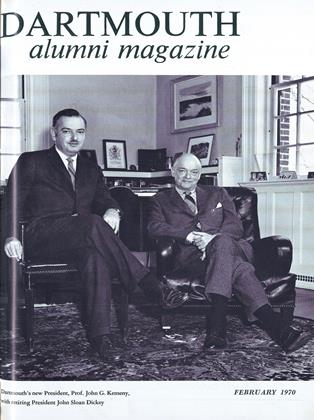LAURENCE I. RADWAY, Professor of Government, is the antithesis of the Ivy Tower stereotype. Scholarly pursuits do not end with publication of a journal article because concern and conscience invariably lead him into the vortex of controversy.
A case in point is what happened last October 23 when, in an unprecedented move, the Faculty of Arts and Sciences voted approval of a motion urging the President of the United States "to accelerate greatly the withdrawal of American troops from Vietnam." The tally was 82 for and 23 against with 35 abstentions.
In presenting the resolution Professor Radway said he did so with reluctance, recognizing that tradition and the logic of experience supported the principle that a faculty normally should not take stands on political issues. He said he sponsored the resolution in this instance because "the present war, including its impact on our educational processes - on our professional work - on the life of this institution warrant such an exception."
First and foremost he is a teacher, as reflected in this statement. Since joining the faculty in 1950 he has served on most major committees and as departmental chairman. Currently he is a member of the Faculty Executive Committee, the External Advisory Board of the Medical School, and an Action Team of New Hampshire Tomorrow, a joint College-private agency effort to preserve the environment.
Professor Radway is a member of a discussion group on arms control which meets monthly at the Council of Foreign Relations, New York City, and is completing a study of recent trends in American military education, to be published by the Twentieth Century Fund. During the past year he has been a guest lecturer at the Industrial College of the Armed Forces and a panelist in a research seminar on American foreign policy at the University of Denver, and he also delivered a paper on ROTC at the Inter-University Seminar on Armed Forces and Society in Chicago.
He and the late Prof. John W: Masland co-authored a book, Soldiers andScholars: Military Education and National Policy, 13 years ago. It is still a standard text and recently was published in Japanese. Last year he published another book, Foreign Policy andNational Defense: The Liberal Democracy in World Affairs. He has written many articles on militarism and party politics and national security.
That his concerns transcend the academic world is evidenced by the following responsibilities assumed in the past two years: member of the New Hampshire Non-Public School Study Commission, civilian aide to the Secretary of the Army for New Hampshire and, hardly last, election to the New Hampshire General Court.
No sooner had he arrived at the State House than he became a force for governmental reform which included a wide spectrum of controversial subjects, ranging from new progressive rates of taxation to aid for parochial schools.
Naturally loquacious, armed with home-made charts and voluminous studies, he constantly buttonholed fellow legislators in corridors and committee rooms.
During a squabble among House Democrats, just three months after his swearing-in, old line party members referred to Professor Radway as "some kind of self-appointed whip" and, reaching back to the lexicon of Adlai Stevenson, "one of those egg-head liberals from Hanover."
Prof. Laurence I. Radway
 View Full Issue
View Full Issue
More From This Issue
-
 Feature
FeatureFrom the Primate Patrimony To the Fellowship of Flowers
February 1970 By JAMES W. FERNANDEZ, -
 Feature
FeatureThe Pros and Cons of Coeducation
February 1970 -
 Feature
FeatureSpeaking of Books
February 1970 By FRANCIS BROWN '25, -
 Feature
FeaturePROF. JOHN G. KEMENY CHOSEN AS DARTMOUTH'S 13TH PRESIDENT
February 1970 -
 Article
ArticleThe Undergraduate Chair
February 1970 By WINTHROP A. ROCKWELL '70 -
 Class Notes
Class Notes1918
February 1970 By EDMUND H. BOOTH, DONALD L. BARR










